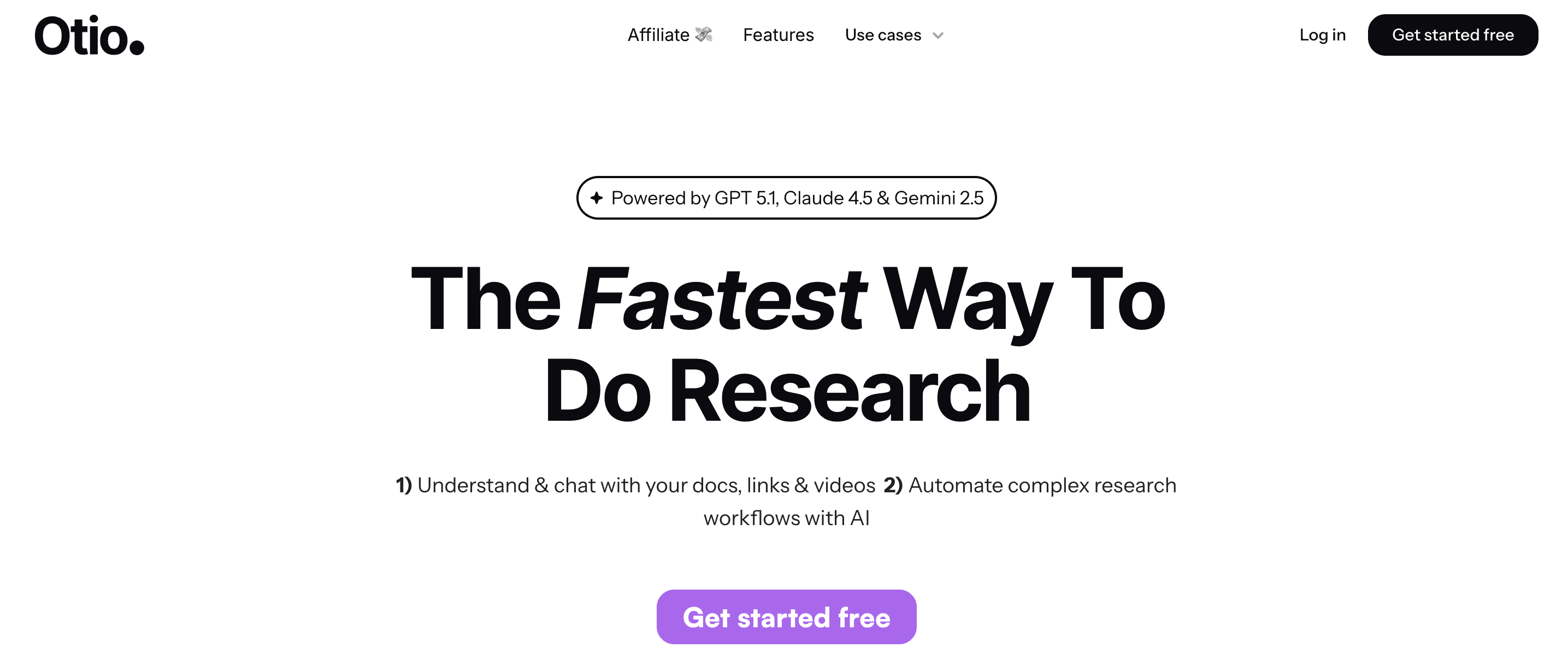Research Paper Sources
Semantic Scholar Review: Features & Benefits
Looking to understand Semantic Scholar better? Stay informed about the latest advancements in academic search technology.
Apr 15, 2024
In this blog, we'll explore the crucial differences between primary vs secondary sources and how this distinction can significantly impact your research. Understanding this differentiation is essential for any academic or scholarly research, as it can determine the quality and reliability of information.
Table of Contents
What Is Semantic Scholar And Who Uses It?

Semantic Scholar is an AI-powered research tool that leverages state-of-the-art natural language processing techniques and machine learning algorithms to enable researchers, students, publishers, and librarians to navigate the vast landscape of scientific literature more efficiently.
Quick Paper Assessment
Semantic Scholar helps users understand the significance of a paper at a glance, enabling them to quickly assess its relevance for their research. By providing concise summaries, key figures, and citations, users can quickly grasp the main ideas presented in a paper and determine its value for their own work.
Tracking Trends
One of the major advantages of Semantic Scholar is its ability to keep users up-to-date on the latest research in their field. By leveraging advanced machine learning algorithms, the tool can identify emerging trends and impactful papers, ensuring that users stay informed about the most recent developments in their area of interest.
Efficient Reading
Another valuable feature of Semantic Scholar is its ability to help users manage their reading lists effectively. By providing personalized recommendations and efficient search capabilities, the tool enables users to organize and prioritize the papers they need to read, streamlining their research workflow.
Efficient Reading
Semantic Scholar can help users gain a deeper understanding of the topics they are researching by providing comprehensive overviews of related research areas. By offering insights into influential papers and trends in a specific field, the tool enables users to enhance their knowledge and make more informed decisions in their research endeavors.
Related Reading
• How To Read Scientific Papers
• Research Notes
• How Many Sources Should A Research Paper Have
• How To Read A Research Paper
• Sources For Research Paper
• How To Find Sources For A Research Paper
• Google Scholar Search Tips
• Literature Synthesis
How Exactly Does Semantic Scholar Work?

Semantic Scholar is an innovative tool designed to help users quickly understand the content of scientific papers and make informed decisions about which papers to read in-depth. It uses natural language processing and machine learning algorithms to analyze scientific papers and extract key information such as the main findings, methods, and conclusions. This tool is especially valuable for researchers who need to stay current with the latest research in their field but may not have the time to read every paper in detail.
Identifying Key Entities in Scientific Papers
One of the main features of Semantic Scholar is its ability to identify key entities in scientific papers. This includes authors, journals, conferences, and more. By extracting this information, the tool can provide users with a comprehensive overview of a paper at a glance. This feature is particularly helpful for researchers who want to quickly assess the credibility of a paper before diving into the details.
Extracting Paper Abstracts, Figures, and Citations
Another critical aspect of Semantic Scholar is its ability to extract paper abstracts, figures, and citations. By analyzing this information, the tool can provide users with a summary of a paper's main points, key visualizations, and the research that influenced the paper. This feature is invaluable for researchers who want to quickly understand the context of a paper before deciding whether to read it in full.
Identifying and Indexing Papers by Research Area
Semantic Scholar also indexes papers by research area, making it easier for users to find papers related to their interests. Researchers can use the tool to search for papers in specific fields, ensuring they stay up-to-date with the latest research in their area of expertise. This feature is especially helpful for scholars who want to track new developments in their field and discover papers that may have flown under the radar.
Linking Papers Together Through Citations
Semantic Scholar links papers together through citations, showing users how research is connected. By visualizing this network of citations, the tool can help researchers understand which papers are most influential in a field and how different pieces of research are related. This feature is beneficial for scholars who want to explore the broader context of a paper and discover related research that may be of interest.
Related Reading
• How To Tell If An Article Is Peer Reviewed
• Reliable Sources For Research
• Literature Search
• How To Summarize A Research Article
• Best Databases For Research
• Using Ai For Research
• Summarize Research Paper Ai
• How To Use Chat Gpt For Research
• How To Search For Research Articles
Key Features And Benefits Of Using Semantic Scholar

Search Feature
The Semantic Scholar search feature allows users to conduct advanced searches across a vast corpus of over 175 million papers. This feature enables users to search by keyword, author, conference, and more, making it easy to narrow down and find exactly what they are looking for in a seamless and efficient manner.
The advanced search capabilities ensure that users can find the most relevant and up-to-date information on their research topic. Whether you are looking for specific keywords, a particular author, or papers related to a certain conference, Semantic Scholar's search feature makes the process easy and effective.
Paper Summaries
Semantic Scholar provides concise summaries of paper abstracts, key figures, and citations. These summaries offer users a quick overview of the main points of a paper, helping them determine if the paper is relevant to their research interests.
By providing key information such as abstracts, figures, and citations, users can quickly assess the relevance and significance of a paper before delving into the full content. This feature saves users time and effort by providing essential information upfront, allowing them to make informed decisions about whether to explore a paper further.
Related Papers
One of the key features of Semantic Scholar is the ability to find papers closely related to any paper. By leveraging advanced algorithms and machine learning techniques, Semantic Scholar enables users to discover connections between research areas and find papers that are closely related to their current research interests.
This feature is especially beneficial for researchers looking to explore new areas of study or delve deeper into a particular topic. By finding related papers, users can expand their knowledge and gain new insights that they may not have encountered otherwise.
Author Profiles
Author profiles on Semantic Scholar provide users with valuable information about an author's publication history, metrics, co-authors, and affiliated institutions. By accessing author profiles, users can gain insights into an author's expertise, research focus, and contributions to the academic community.
This information helps users evaluate the credibility and authority of an author, enabling them to make informed decisions about citing or collaborating with specific authors. Author profiles are instrumental in establishing connections with other researchers and building a network within the academic community.
My Library
Semantic Scholar's "My Library" feature allows users to save papers to a personal library and annotate them. Users can organize and categorize saved papers for easy access and reference. The annotation feature enables users to add notes, highlights, and comments to papers, helping them capture insights, key points, and ideas for future research.
The "My Library" feature serves as a personalized repository for users to store, manage, and interact with their research materials effectively. By saving papers and adding annotations, users can create a valuable resource that supports their research endeavors.
Metrics and Rankings
Semantic Scholar provides paper-level metrics like citations and influential scores, as well as author-level metrics like the h-index. These metrics and rankings offer users a quantitative measure of the impact and significance of papers and authors.
By analyzing metrics such as citations and h-index, users can assess the quality, relevance, and influence of papers and authors in their field of study. These metrics help users make informed decisions about which papers to read, cite, or collaborate on, ultimately enhancing the quality and credibility of their research.
APIs
Semantic Scholar offers APIs for search, academic graphs, and more, which are useful for developing research applications. By leveraging Semantic Scholar's APIs, developers can access a wealth of academic data and metadata to build innovative research tools and applications.
The APIs enable developers to create custom search interfaces, academic recommendation systems, data visualizations, and more. With easy access to Semantic Scholar's APIs, developers can leverage the platform's rich data resources to create valuable tools that enhance the research experience for users.
Semantic Reader
Semantic Scholar's Semantic Reader is an augmented PDF reader that makes papers more accessible through definitions, citations, and other helpful features. The Semantic Reader enriches the reading experience by providing definitions of key terms, contextual citations, and links to related papers, enabling users to deepen their understanding and explore additional content seamlessly.
This feature enhances the accessibility and usability of research papers, making it easier for users to navigate complex topics and concepts. Through the Semantic Reader, users can engage with papers more effectively and extract greater value from their reading experience.
Limitations Of Semantic Scholar

Limited Language Support
Semantic Scholar primarily supports English-language scientific papers, which may limit its usefulness for researchers working with non-English sources. In Semantic Scholar Review, I understand that this drawback can be a significant limitation for researchers who rely on non-English sources for their work. Researchers who work with scientific papers in languages other than English may find Semantic Scholar less useful due to this limitation.
Potential for Inaccuracies
While Semantic Scholar's AI algorithms are highly advanced, there is still a risk of inaccuracies or misunderstandings in the summaries it generates. In Semantic Scholar Review, I acknowledge that the AI algorithms used by Semantic Scholar may not always accurately interpret or summarize scientific papers. Despite the advancements in AI technology, there is always a chance of inaccuracies in the summaries provided by Semantic Scholar.
Lack of Contextual Understanding
Semantic Scholar's AI algorithms may struggle to understand the nuances and context of scientific papers, potentially leading to misinterpretations or oversights. Contextual understanding is crucial in scientific research, and Semantic Scholar's AI algorithms may not always grasp the full context of a paper. In Semantic Scholar Review, I recognize that this lack of contextual understanding can be a drawback for researchers who need a comprehensive understanding of scientific literature.
Potential for Bias
Semantic Scholar's AI algorithms may be subject to biases or limitations in the data they analyze, potentially leading to biased or incomplete summaries of scientific papers. Experts in Semantic Scholar Review understand that AI algorithms are not immune to biases, which can affect the accuracy and completeness of the summaries provided by Semantic Scholar. Researchers should be aware of the potential for bias when using Semantic Scholar for their research.
No Direct Integrations
You can't easily integrate with reference or citation managers. In Semantic Scholar Review, I understand that the lack of integration with popular reference and citation managers can be a drawback for researchers who rely on these tools for their work. Semantic Scholar users may find it challenging to seamlessly incorporate their research findings into their existing reference management workflows.
Let Otio be your AI research and writing partner — try Otio for free today!
Tips For Effectively Using Semantic Scholar

Setting up your account preferences is crucial for getting the most out of your Semantic Scholar experience. By accessing your account settings, you can ensure that the content you receive aligns with your research goals and interests. From contact preferences to alert preferences, tailoring these settings will keep you informed about relevant updates and findings in your field.
Enabling Email Alerts for Enhanced Awareness
Stay ahead of the curve with daily or weekly email alerts. By setting up notifications for authors, papers, and topics related to your research, you will receive timely updates on new publications and emerging trends. These alerts will keep you informed about the latest developments in your areas of interest, allowing you to remain at the cutting edge of your field.
Leveraging AI-Powered Research Recommendations
Harness the power of AI with personalized research feeds. By selecting papers relevant to your research and refining them through rating, you can create tailored feeds that cater to your specific interests. Stay informed about the latest publications that matter to you and streamline your research process with AI-powered recommendations.
Building a Library of Key Research Papers
Create your research library by saving papers of interest to you. Organize your library by using tags, making it easy to retrieve and reference the material when needed. By building a comprehensive collection of relevant papers, you can streamline your research workflow and access essential resources at your fingertips.
Utilizing Browser Extensions for Seamless Access
Maximize your accessibility by installing Semantic Scholar browser extensions. Available for Chrome and Firefox, these extensions enable you to seamlessly access research materials and stay updated on the latest knowledge in your field. By integrating these tools into your browsing experience, you can enhance your efficiency and productivity as a researcher.
Enhancing Access to Library-Subscribed Content
For students seeking seamless access to library-subscribed content, consider using the recommended browser tools. The Off Campus Access Bookmarklet and EndNote Click Browser Extension ensure that you can access and utilize library resources effortlessly. By incorporating these tools into your workflow, you can leverage a wealth of scholarly content and enrich your research endeavors.
7 Best Alternatives To Semantic Scholar
If your research still feels like a patchwork of PDFs, videos, and half-finished notes, try Otio to gather clips and sources into one workspace and let AI surface concise, source-grounded notes. It helps you move from evidence to draft faster, so you spend less time stitching materials together and more time writing with confidence.
1. Otio — AI Research & Writing Workspace (Beyond Semantic Scholar)

What Otio Does Better Than Semantic Scholar
While Semantic Scholar helps you find papers, Otio helps you actually finish research. Otio goes beyond academic papers by letting users collect YouTube videos, PDFs, articles, tweets, and books in one workspace. It then extracts AI-generated notes, enables source-grounded Q&A chat, and helps turn research into drafts, essays, and papers—something Semantic Scholar doesn’t support.
Otio replaces fragmented workflows by combining discovery, note-taking, synthesis, and writing into one AI-native environment.
Pros
Supports non-academic sources (videos, web articles, notes)
AI-generated notes for every source
Chat with individual sources or entire knowledge bases
Assists with drafting papers and essays
End-to-end research workflow
Cons
Less focused on citation metrics than Semantic Scholar
Best suited for synthesis and writing rather than raw discovery
Not a citation-indexing authority
2. PubMed — Biomedical Precision (Narrower but Deeper)
What PubMed Does Better Than Semantic Scholar
PubMed is superior for biomedical and life sciences research, offering highly curated MEDLINE records. Compared to Semantic Scholar, PubMed provides more authoritative medical indexing and controlled vocabularies like MeSH terms.
Pros
Extremely reliable for medical and life science research
Free access
Strong domain-specific indexing
Cons
Limited to biomedical fields
Minimal AI summarization or synthesis
No writing or note-generation features
3. Scopus — Broad Citation Analytics (Enterprise-Level)
What Scopus Does Better Than Semantic Scholar
Scopus excels in citation tracking, author metrics, and institutional analytics. It provides broader coverage and more detailed citation data across disciplines compared to Semantic Scholar.
Pros
Strong citation and author analytics
Covers sciences, social sciences, and humanities
Trusted for institutional evaluation
Cons
Expensive subscription
No AI-driven writing or synthesis tools
Overkill for individual researchers
4. Web of Science — Deep Citation Authority
What Web of Science Does Better Than Semantic Scholar
Web of Science offers highly selective indexing and deep historical citation data, making it ideal for systematic reviews and impact analysis.
Pros
Authoritative citation indexing
Long historical coverage
Trusted in academic evaluations
Cons
Subscription-only
Less intuitive UI
No AI summaries or drafting support
5. Microsoft Academic — Advanced Academic Mapping (Legacy Tool)
What It Did Better Than Semantic Scholar
Microsoft Academic was known for graph-based citation analysis and structured academic metadata. It offered powerful insights into research relationships.
Pros
Strong citation mapping (historically)
Free access
Broad academic coverage
Cons
Discontinued
No longer actively updated
Not usable for current research
6. Google Scholar — Breadth Over Depth
What Google Scholar Does Better Than Semantic Scholar
Google Scholar indexes a much wider range of materials, including theses, books, preprints, and non-traditional publications that Semantic Scholar may miss.
Pros
Massive coverage
Free and easy to use
Finds obscure or non-indexed materials
Cons
No quality filtering
Weak metadata accuracy
No AI summaries or workflow support
7. arXiv — Speed Over Validation
What arXiv Does Better Than Semantic Scholar
arXiv provides early access to cutting-edge research before peer review, especially in physics, computer science, and mathematics.
Pros
Immediate access to latest research
Free and open
Essential for fast-moving fields
Cons
No peer review
No summaries or synthesis
Requires domain expertise to evaluate quality
Supercharge Your Researching Ability With Otio — Try Otio for Free Today
Otio is a new tool that aims to help with the overwhelming amount of content that knowledge workers, researchers, and students face. The tool is designed to make the process of collecting, extracting key takeaways, and creating content faster and more efficient. Otio offers a wide range of sources to collect data from, including bookmarks, tweets, extensive books, and YouTube videos.
AI-Generated Notes and Q&A Chat Features
One of the standout features of Otio is its AI-generated notes on all bookmarks. This feature is particularly useful for various types of content, such as YouTube videos, PDFs, and articles. The AI-generated notes help in summarizing and highlighting the key points from the source material, making it easier to reference and use later. Otio enables users to chat with individual links or entire knowledge bases, much like having a conversation with ChatGPT, the AI chatbot.
AI-Assisted Writing Capabilities
Otio also offers AI-assisted writing capabilities, making it easier to generate drafts and complete research papers or essays in a faster and more efficient manner. The ability to go from a reading list to a first draft quickly can be a game-changer for researchers. By leveraging Otio's features, users can extract key takeaways from their collected sources and seamlessly integrate them into their writing.
Try Otio for Free Today
Otio aims to be the go-to AI research and writing partner for knowledge workers, researchers, and students. By simplifying the process of collecting, extracting, and creating content, Otio offers a comprehensive and efficient workspace for those dealing with content overload.
With features like AI-generated notes, Q&A chat, and AI-assisted writing, Otio brings a new level of ease and efficiency to the research and writing process.
Related Reading
• Best Reference Manager
• Chatpdf Alternative
• Ai Research Tools
• Elicit AI
• Consensus Ai
• Research Paper Writing App
• Research Paper Reader
• How Does Chatpdf Work
• Scholarcy Alternative




